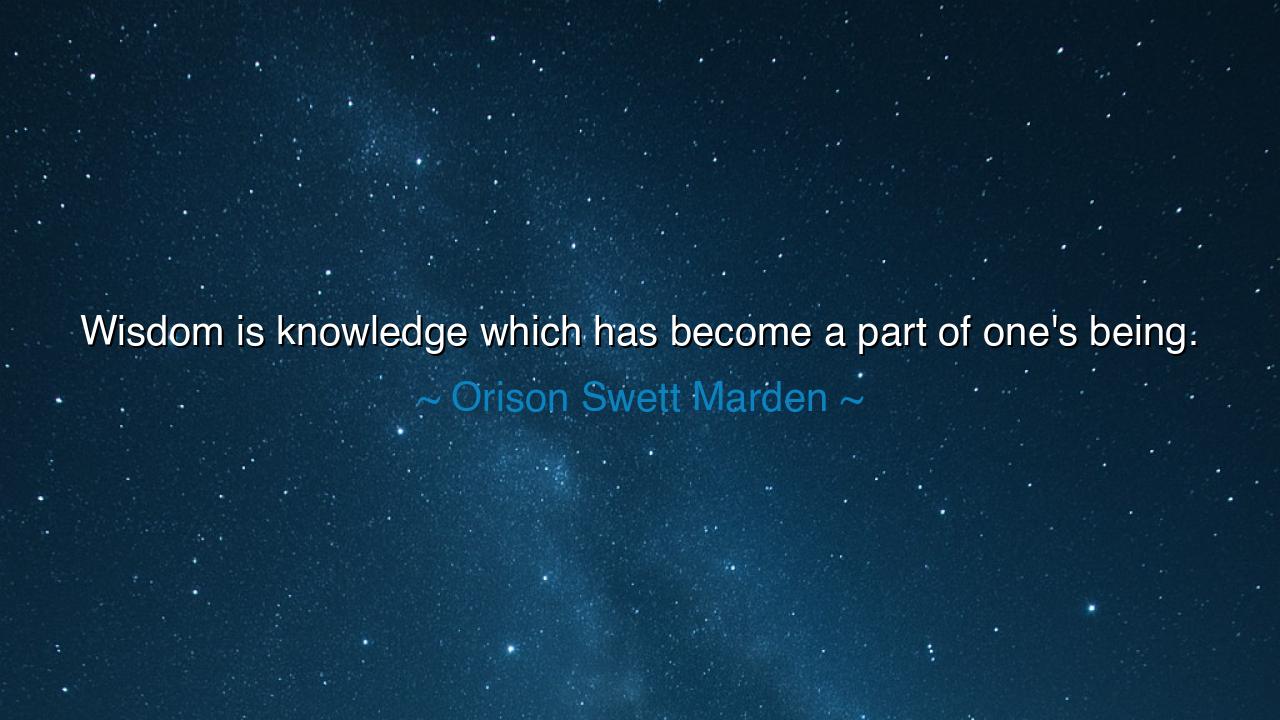
Wisdom is knowledge which has become a part of one's being.






The words of Orison Swett Marden, that tireless teacher of self-mastery and noble living, shine like a lamp in the temple of the human soul: “Wisdom is knowledge which has become a part of one’s being.” In this single sentence lies the difference between the scholar and the sage, between the one who knows much and the one who truly understands. Knowledge may be gathered from books, lectures, and experience, but wisdom is knowledge that has sunk deep into the marrow of the spirit—it is truth that has been lived, suffered, and proven. For what is learned by the mind may be forgotten, but what is engraved upon the heart endures forever.
Marden, a man of the late nineteenth and early twentieth centuries, lived in an age of ambition and transformation. He wrote for those who sought to rise from hardship, to master themselves and their destinies. Yet even amidst the roar of industry and progress, he called men back to an older truth—that the measure of greatness is not what one knows, but what one is. His words carry the echo of ancient teachers—from Confucius to Marcus Aurelius—who taught that learning is useless unless it shapes the soul. Thus, when Marden said that wisdom is knowledge made a part of being, he was not offering mere moral advice; he was defining the alchemy by which thought becomes virtue, and virtue becomes power.
The transformation from knowledge to wisdom is not a gentle one. It is the work of trial, reflection, and endurance. A man may know that patience is a virtue, yet he is not wise until he has practiced patience through suffering. He may read that kindness softens hearts, but he does not understand until he forgives one who has wounded him. Only when knowledge passes through the fires of experience does it become part of one’s being. Then it no longer rests upon the lips—it speaks from the life itself. The wise do not need to prove what they know; their very presence reveals it.
Consider the story of Mahatma Gandhi, who studied law in England and learned the doctrines of justice from books. But it was not in courtrooms or libraries that he found wisdom—it was in the struggle of his people, in the prison cell, in the long march toward freedom. There, knowledge of justice became part of his being; it shaped his speech, his choices, his very breath. He did not simply know the truth—he became it. This is the meaning of Marden’s words: to live in such a way that what you believe is no longer separate from who you are.
Many possess knowledge, but few are transformed by it. The learned man may recite sacred texts, yet remain unkind; he may speak of virtue, yet live in vanity. But the wise man—his heart and his mind are one. His thoughts flow into deeds, and his deeds confirm his thoughts. In him, there is harmony between word and action, knowing and doing. Thus the ancient saying endures: “He who knows himself is enlightened.” For to know oneself truly is to weave understanding into the very fabric of existence.
Marden’s message is also a call to humility. He reminds us that knowledge alone is never enough. It must be digested by the soul, as food is digested by the body, before it can give strength. A library of learning cannot make a wise man, but a single lesson lived sincerely can transform a life. The path to wisdom, then, is not endless study but constant practice—living each truth until it breathes through you as naturally as air.
O seeker of truth, take this lesson into your heart: do not seek to know merely for knowing’s sake. Let your knowledge pass into your life, and your life refine your knowledge. Read less, but live more deeply. Do not merely speak of love—love. Do not merely admire courage—act bravely. In this union of understanding and action lies the seed of wisdom.
And remember, as Marden taught, that wisdom is not a crown to be worn, but a fire to be tended. Each day you must feed it with humility, discipline, and sincerity. Let every experience, whether joyful or painful, teach you something real. When truth becomes instinct, when virtue flows without effort, then knowledge has become one with your being—and you, in turn, will walk as one of the wise.






AAdministratorAdministrator
Welcome, honored guests. Please leave a comment, we will respond soon